AWM41 989 - [Nurses Narratives] Sister Kellick - Part 3
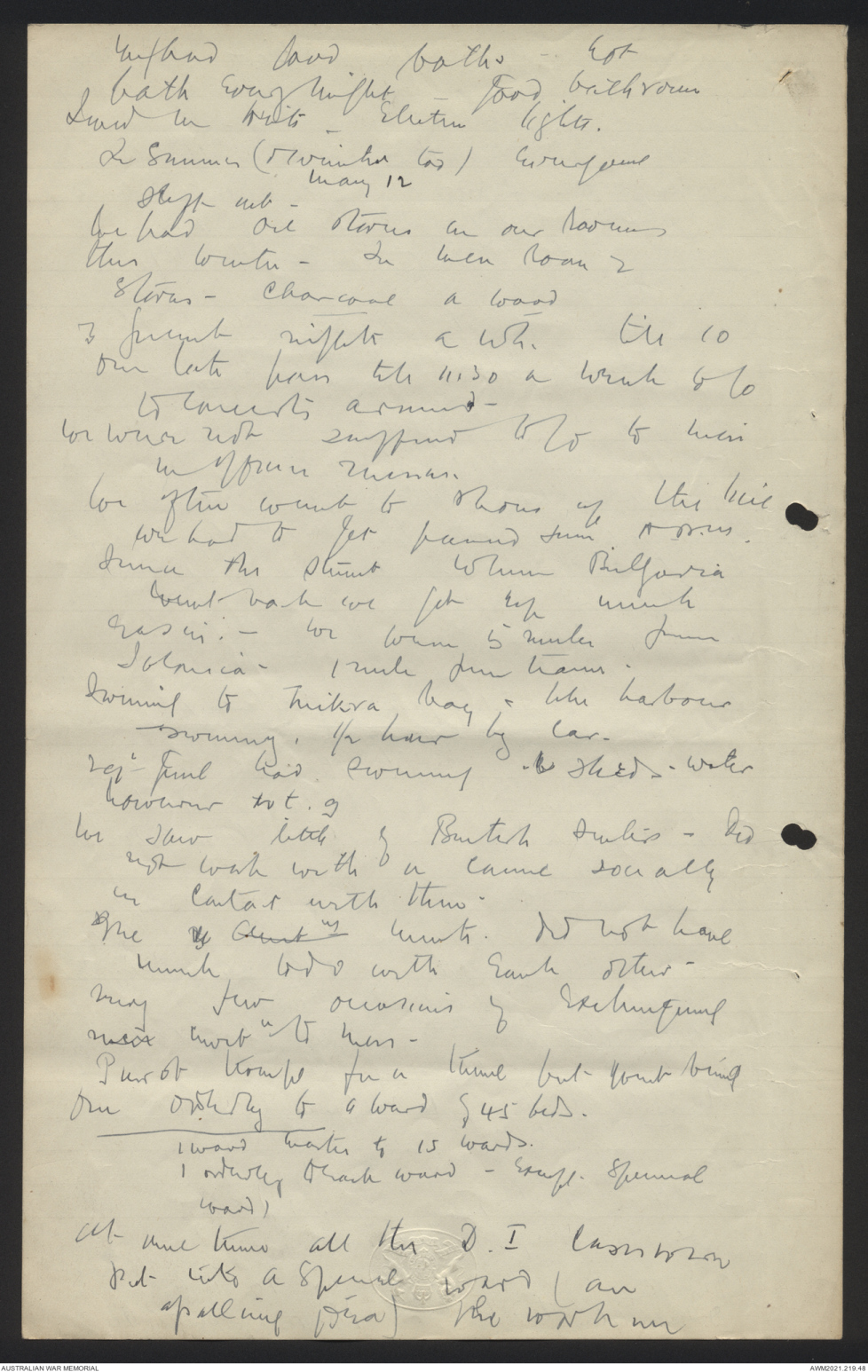
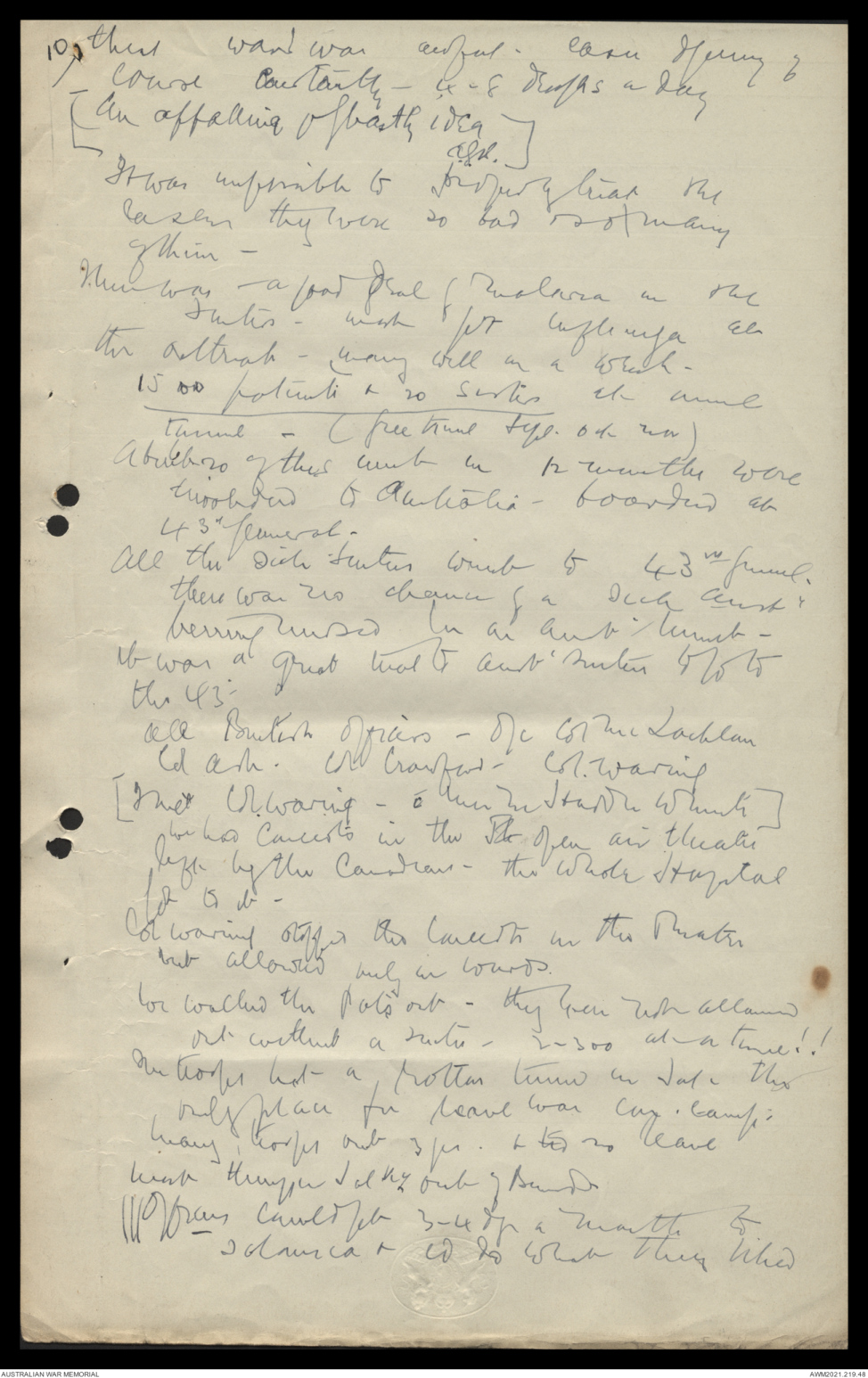
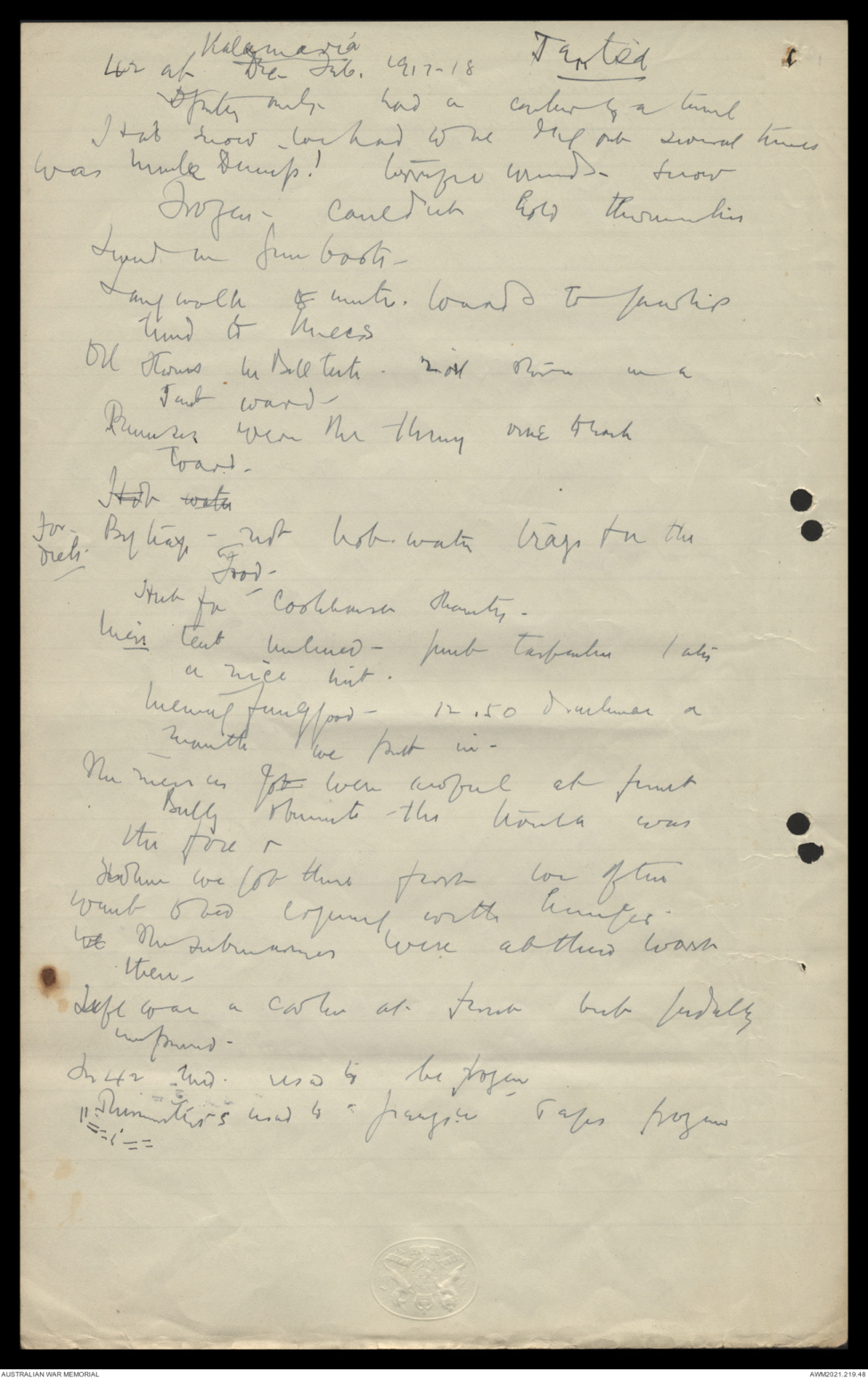
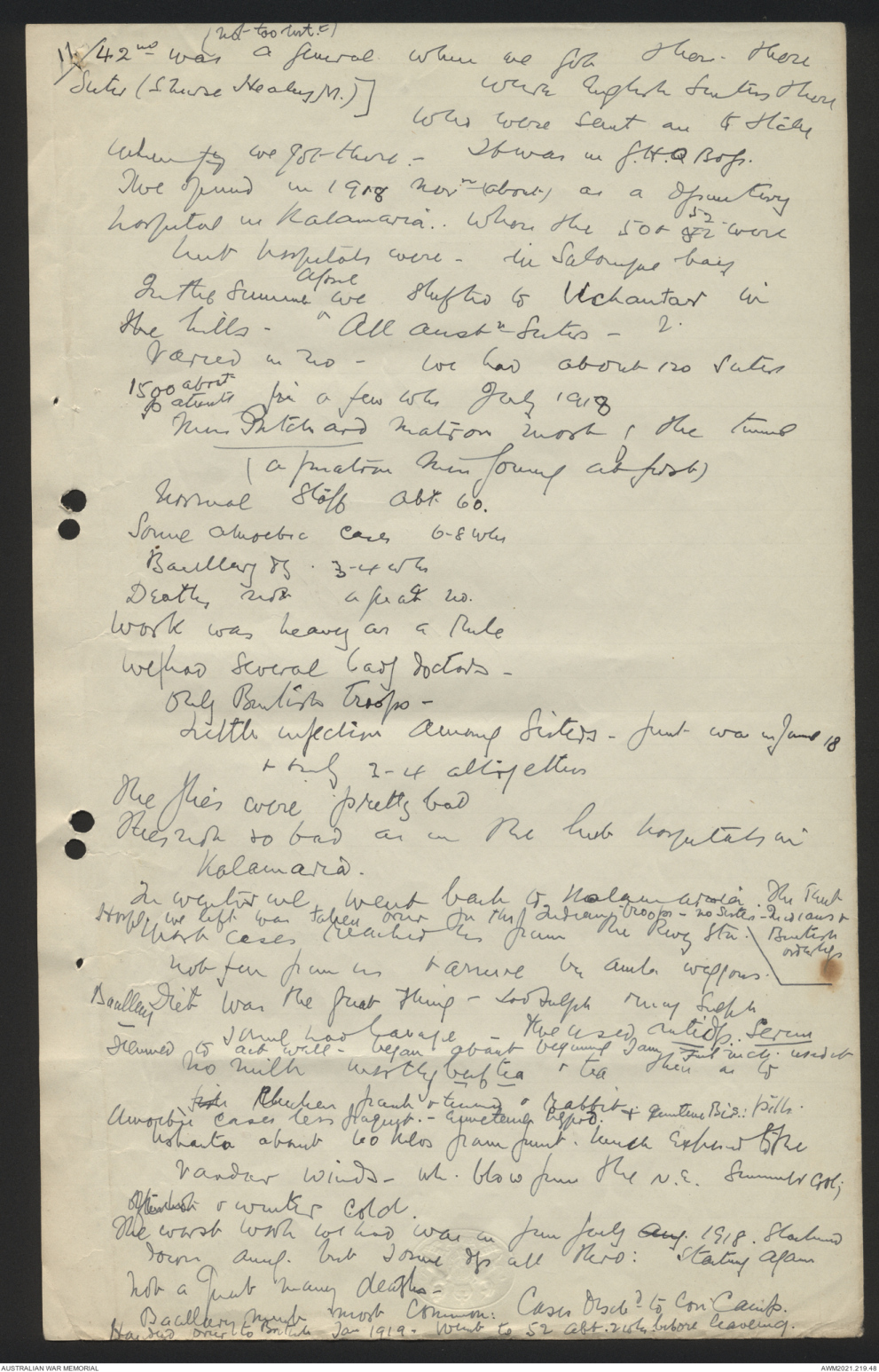
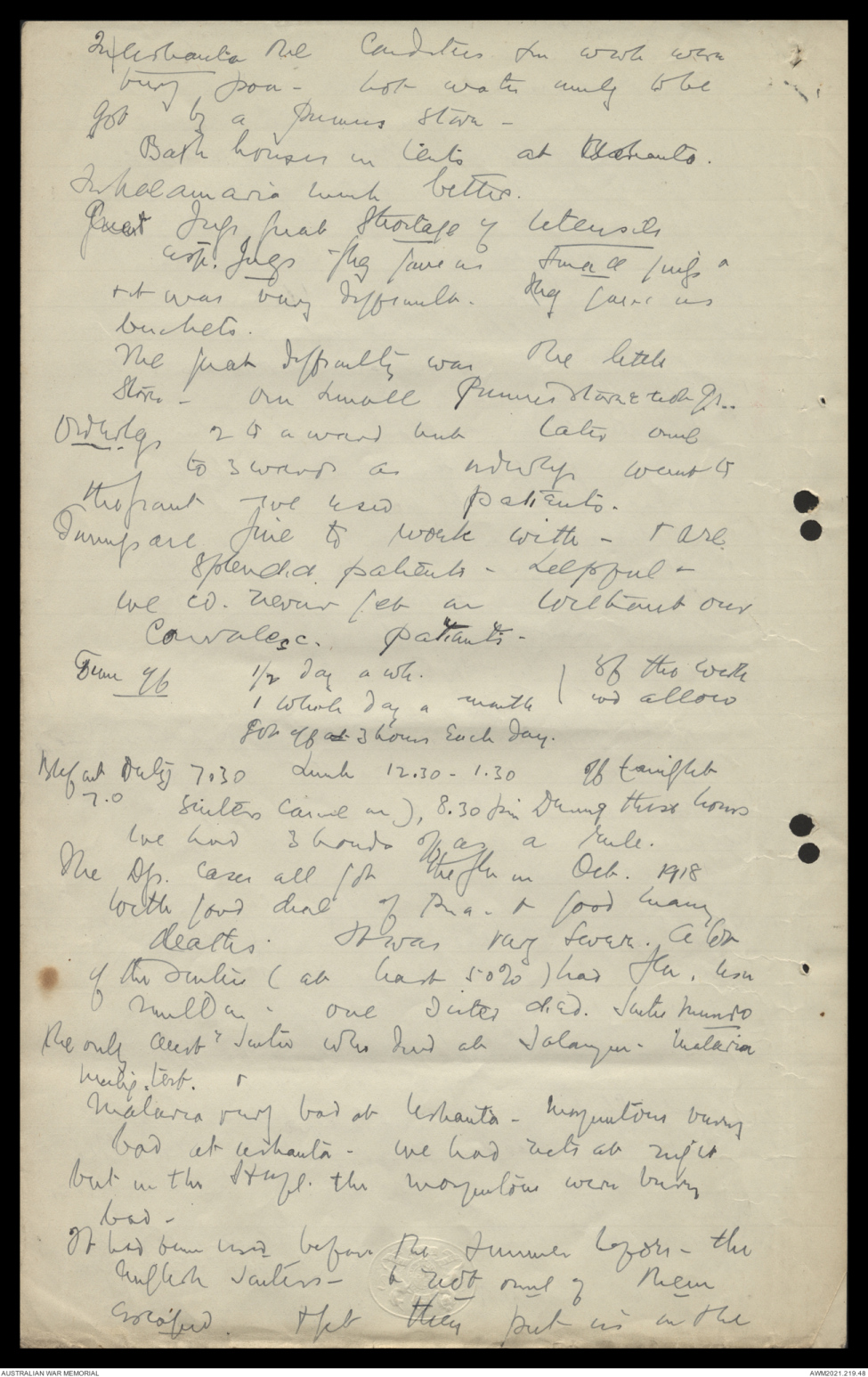
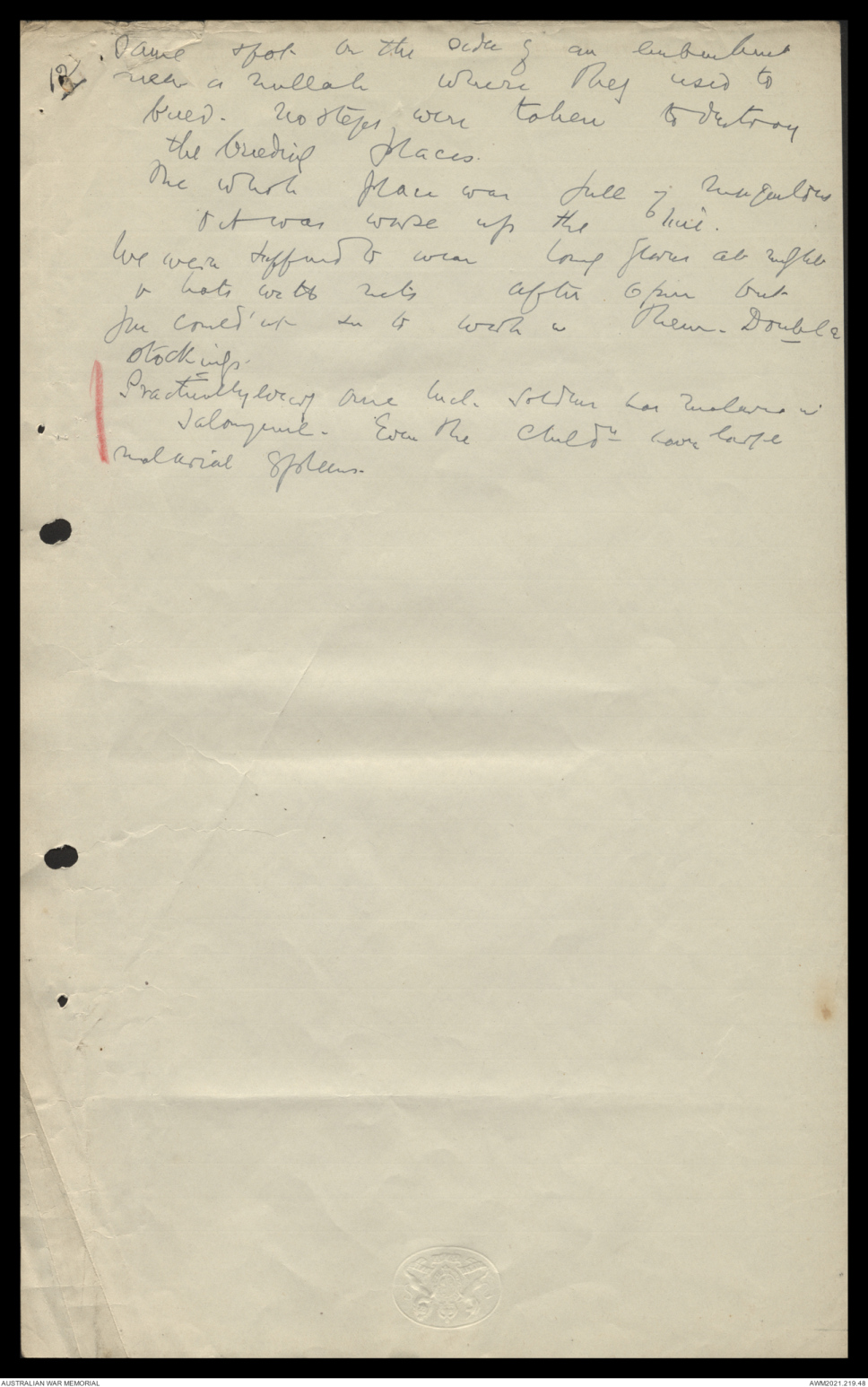
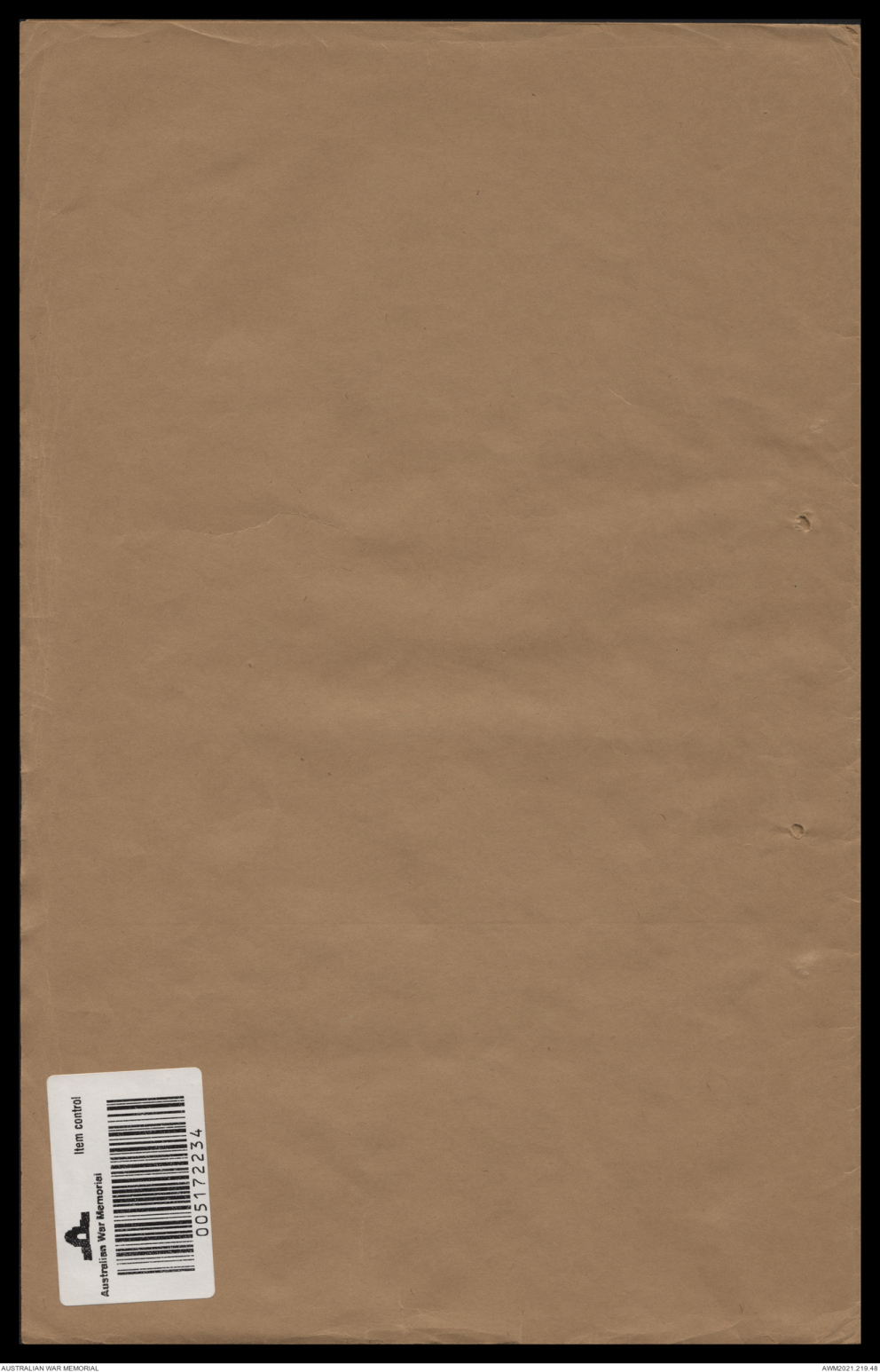
We had good baths - hot
bath every night - good bathroom
lived in huts - electric lights.
In Summer (& Winter too May 12) everyone
slept out -
We had oil stoves in our rooms
this winter - In men Room 2
stoves - charcoal & wood
3 guest nights a wk. till 10
one late pass till 11.30 a week to go
to concerts around -
we were not suppose to go to mess
in officers messes
We often went to shows up the hill
We had to get passed from AD.M.
Since the stunt when Bulgaria
went back we got up much
easier. - we were 5 miles from
Salonica. 1 mile from trains.
Swimming to Mikra bay. like harbour
swimming. ½ hour by car.
29thJune had swimming- to sheds - water
however not . g
We saw little of British soldiers - did
not work with or came socially
in contact with them.
The xx Aust. units. did not have
much to do with each other -
very few occasions of exchanging
xxx invtn to mess -
Plent of trouble for a time but unit being
one orderly to a ward of 45 beds.
1 ward matron to 15 wards.
1 orderly to each ward - except Spinal
ward)
At one time all the D.I. Cases were
put into a Spinal ward (an
apalling idea) The work in
10
their ward was awful. Cases dying of
course constantly - 4 - 8 deaths a day
[An appalling & ghastly idea A.G.H.]
It was impossible to properly treat the
cases they were so bad & so many
of them -
There was a good deal of Malaria in the
Sisters - most got Influenza at
the outbreak - many well in a week.
1500 patients & 20 Sisters at meal
time - (free time & p. of war)
About 20 of this unit in 12 months were
invalided to Australia - boarded at
43rd General.
All the sick Sisters went to 43rd General.
there was no chance of a sick Austn
being nursed in an Aust. Unit -
It was a great treat for Aust Sisters to go to
the 43rd.
All British officers - O/C Col McLachlan
Col Ash. Col Crawford - Col. Waring
[I met Col. Waring - with Miss McHardie White)
We had Concerts in the xx open air theatre
left by the Canadians - the whole Hospital
got to it -
Col Waring stopped the concerts in the theatre
but allowed only in wards.
We walked the patient - they were not allowed
out without a sister - 2-300 at a time!!
Our troops had a rotten turn in Sal. the
only place for leave was Can. Camp.
Many troops out 3 yrs. & hd no leave
went through in Salka out of bounds
||| Officers could get 3-4 dys a month to
Salonica & cd do what they liked
Kalamaria Tented
42 at Dec - Feb 1917-18
Dysentery only. had a corker of a time
It wd snow - we had to be dug out several times
was Mule Dump! terrific winds - snow
Frozen - couldnt hold thermometers
& went in gum boots.
Long walk to [[......tr.?]] wards with [[panties?]]
tied to knees
All nurses in Bell tents. & all others in a
Tent ward -
Primuses were the thing one to each
Ward.
Hot water
For diets By trays - not hot water trays for the
food.
Hut for Cookhouse Shanty
Mess tent unlined - just tarpaulins later
a nice hut.
Messing fund good - 12.50 drachmas a
month we put in
The messes got were awful at first
Bully & biscuits the trouble was
the fire &
When we got there first we often
went to bed crying with hunger.lot The submarines were at their worst
then.
Life was a corker at first but finally
improved.
In 42 Med. used to be frozen
[Thermometers used to freeze. w taps frozen
Diagram - see original document
11
(not too [[?]])
42nd was a general when we got there. There
Sisters (S. Nurse Healey M.) were English sisters there
who were sent on to Italy
when fy we got there. - It was a G.H.Q Bofs.
We opened in 1918 Novr (about) as a dysentery
hospital in Kalamaria. Where the 50 & x2 52 were
hut hospitals were - in Salonique bay
In the Summer ^April we shifted to Uchantar in
the hills - All Austn Sisters - 2.
Varied in no - we had about 120 Sisters
about 1500 patients for a few wks July 1918
Miss Pritchard matron most of the time
(a/matron Miss Young at first)
Medical Staff abt 60.
Some amoebic cases 6-8 wks
Bacilliary dys. 3-4 wks
Deaths not a great no.
Work was heavy as a Rule
we had several lady Doctors -
only British troops -
Little infection among Sisters - just one in June 18
& only 3-4 altogether
The flies were pretty bad
Flies not so bad as in the hut hospitals in
Kalamaria.
In winter we went back to Kalamaria. The Tent
Hosp we left was taken over for the Indian troops - no sisters- Indians
& British orderlys
Most cases reached us from the Rwy Stn.
not far from us & arrive by amb. waggons.
Bacillary Diet was the great thing - Sod sulph & mag sulph
Some had lavage - & we used antidp. Serum
Seemed to act well - began about beginning Jan [[Feb Mch?]] used it then as cd
No milk mostly beef tea & teaFish Chicken fresh and tinned & rabbit.
Amoebic cases less frequent - emetene helped & emetene Bc's.: pills.
Ushanta about 60 kilos from front and much exposed to the
Vandar winds - wh. blow from the N.E. Summer cool;xxxxxx & winter cold.
The worst work we had was in June July Aug. 1918. Slowed
down Aug. but some some ops all thro: Starting again
not a great many deaths.
Bacillary numb most common: Cases dischd to Con Camp
Handed over to British Jan 1919. Went to 52 abt. 2 wks. before leaving.
In Ushanta the conditions for work were
very poor - hot water only to be
got by a primus stove.
Bath houses in tents at Ushanta.
In Kalamaria much better.Great Jugs great shortage of utensils
esp. Jugs they gave us smaller jugs
& it was very difficult. They gave us
buckets.
The great difficulty was the little
stores - one small primus stove to each qr..
Orderlys 2 to a ward but later one
to 3 wards as orderlys went to
the front we used patients.
[[?]] are fine to work with - & are
splendid patients - helpful -
we cd. never get on without our
convalesc. patients.
Time off 1/2 day a wk [if the work wd allow
1 whole day a month
got off 3 hours each day.
Breakfast 7.0 Duty 7.30 Lunch 12.30-1.30 Off (night
sisters came on), 8.30 pm during these hours
we had 3 hours off as a rule.
The Dys. cases all got the flu in Oct. 1918
with good deal of pna. & good many
deaths. It was very severe. A lot
of the sisters (at least 50%) had flu. Miss
Millar and one sister died. Sister Munro
the only Austn sister who died at Salonique. Malaria
waiting test. &
Malaria very bad at Ushanta - Mosquitoes very
bad at Ushanta. We had nets at night
but in the Hospl the mosoquitoes were very
bad.
It had been used before the Summer before - the
English sisters - & not one of them
escaped & yet they put us in the
12
same spot on the side of an embankment
near a nullah where they used to
breed. No steps were taken to destroy
the breeding places.
The whole place was full of mosquitoes
& it was worse up the line.
We were supposed to wear long gloves at night
& hats in the wards after 6 pm but
you couldn't see to work in them. Double
stockings.
Practically every one incl. soldier has malaria in
Salonique. Even the childn have large
malarial spleens.
[*Australian War Memorial
Item control
005172234*]
 Loretta Corbett
Loretta CorbettThis transcription item is now locked to you for editing. To release the lock either Save your changes or Cancel.
This lock will be automatically released after 60 minutes of inactivity.